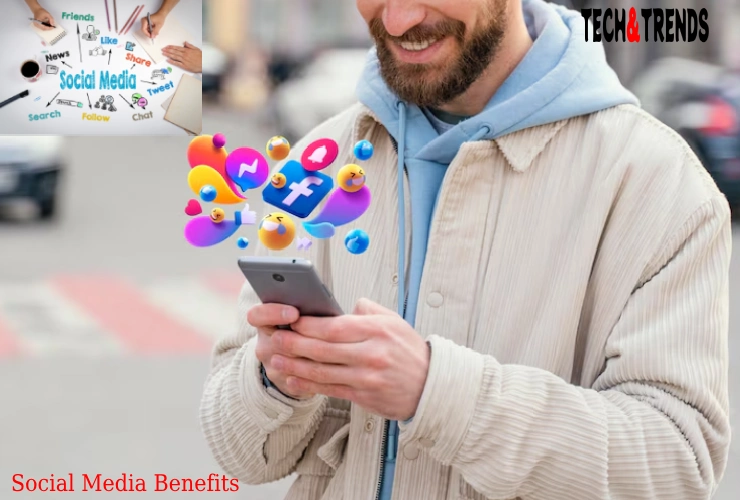Social media has become an integral part of modern life, influencing how individuals communicate, businesses market, and societies interact. While it offers numerous Social Media Benefits:, it also presents real challenges that users and organizations must navigate carefully.
This article provides an informative and SEO-friendly overview of the key advantages and disadvantages of social media in 2025, helping readers understand its impact and how to leverage it effectively.
Understanding Social Media Benefits: Explore Key Advantages and Real Challenges
Social media platforms like Facebook, Instagram, TikTok, LinkedIn, and Twitter connect billions worldwide, creating unprecedented opportunities for communication, marketing, education, and entertainment. However, alongside these benefits lie challenges such as privacy risks, misinformation, and digital addiction. Exploring these aspects provides a balanced view crucial for users and businesses alike.
Key Advantages of Social Media
1. Global Connectivity and Instant Communication
Social media shrinks the world by enabling people from different countries and cultures to connect instantly. Whether through messaging, video calls, or social networking, users can maintain relationships and share experiences in real time, overcoming geographical barriers.
2. Access to Information and Real-Time Updates
Platforms serve as hubs for news, trends, and educational content. Users can stay informed about global events, learn new skills through tutorials, and follow influencers or experts in various fields, all with immediate access.
3. Business Growth and Marketing Opportunities
Social media revolutionizes business marketing by offering cost-effective ways to reach large, targeted audiences. Brands can build awareness, engage customers directly, and analyze campaign performance in real time. Small businesses especially benefit from the global reach and low entry barriers provided by platforms like Instagram and Facebook.
4. Creative Expression and Community Building
Users can showcase talents through photos, videos, and posts, fostering creativity and self-expression. Social media also helps build supportive communities around shared interests, whether for hobbies, mental health, activism, or professional networking.
5. Career Networking and Job Opportunities
LinkedIn and similar platforms connect job seekers with employers and industry professionals, facilitating networking, learning, and career advancement. This feature is invaluable for personal growth and professional development.
6. Amplifying Social Causes and Awareness
Social media acts as a megaphone for important issues, rallying support and raising awareness for causes such as climate change, mental health, and social justice. It empowers activists and organizations to reach wider audiences quickly.
7. Time and Cost Efficiency
Automation tools, scheduling features, and AI-powered analytics save time and resources for businesses and content creators. This efficiency allows consistent engagement without the need for constant manual effort.
Please visit our site for more informative articles.
Real Challenges of Social Media
1. Privacy and Security Concerns
Sharing personal information online exposes users to risks like data breaches, identity theft, and unauthorized tracking. Despite improvements, privacy remains a significant concern requiring vigilance and platform accountability.
2. Spread of Misinformation and Fake News
False information can spread rapidly, causing confusion and harm. Social media companies are investing in algorithms and fact-checking measures, but users must critically evaluate content to avoid being misled.
3. Cyberbullying and Online Harassment
The anonymity and reach of social media can facilitate bullying, harassment, and toxic behavior, impacting mental health and well-being. Platforms are enhancing safety features, but challenges persist.
4. Digital Addiction and Mental Health Impact
Excessive social media use can lead to addiction, reduced productivity, anxiety, and depression. Balancing usage and promoting digital well-being are essential for users.
5. Algorithmic Bias and Filter Bubbles
Social media algorithms prioritize certain content, sometimes reinforcing biases and limiting exposure to diverse viewpoints. This can polarize users and reduce critical thinking.
Future Trends and How to Navigate Social Media
The future of social media in 2025 and beyond involves enhanced technologies like augmented and virtual reality, improved privacy safeguards, and the rise of niche communities focused on meaningful connections. Voice communication is also gaining traction as an alternative to text-based interaction.
To make the most of social media benefits while mitigating challenges, users and businesses should:
- Prioritize privacy settings and data protection
- Verify information before sharing
- Use social media mindfully to avoid addiction
- Engage positively and report harmful behavior
- Leverage analytics and automation for effective marketing
- Participate in communities that foster support and growth
Conclusion
Social media offers powerful benefits, including global connectivity, business growth, creative expression, and social awareness. However, it also presents real challenges such as privacy risks, misinformation, and mental health concerns.
By understanding and balancing these advantages and disadvantages, individuals and organizations can harness social media as a constructive tool in 2025 and beyond, ensuring it remains a force for positive connection and opportunity.


Comments are closed.